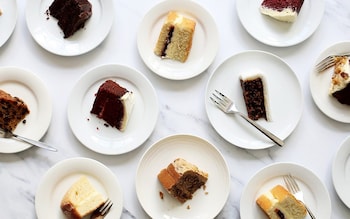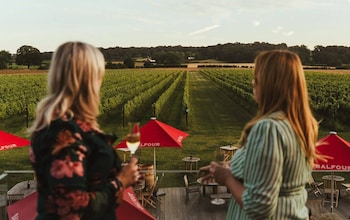“If I am out in public, feeding the kids, people look at me like I’m a returning war hero,” says George Lewis, comedian and author of DON’T PANIC!: All the Stuff the Expectant Dad Needs to Know. “It’s unfair – I’m just doing what my wife does every day – but it’s very hard not to enjoy.”
In fact, Lewis does a lot of the cooking at home: not all of it, and not happily (“every time it gets to teatime I’m caught by surprise by the fact I have to do it all over again”) but he does far more than his father or stepfather did. He is part of what anthropologist Anna Machin has dubbed “the era of involved fatherhood”, where dads are more hands-on. Attitudes have changed, and more dads than ever are doing domestic labour and childcare. Chefs like Marco Pierre White and Jamie Oliver have made cooking cool – even sexy.
Nevertheless, the stereotypes persist, as the existence of “when your dad cooks” posts on TikTok will tell you. “I call this ‘Dad made dinner’,” says one eye-rolling user, clearly unimpressed with the hastily compiled meal in front of her. “I want to say [these stereotypes are] terrible and we should end them, because we should, but they work well for us because they set such a low bar,” says Lewis. Journalist Ed Cumming agrees. The father of two does all the cooking. “It’s fun showing off, or doing the barbecue. What is not fun is coming home at 6pm via Tesco. It’s boring. Dads need to do more of the stuff that’s boring.”
They do – but that doesn’t necessarily mean cooking, says Richard Reeves, author of Of Boys And Men: Why the Modern Male is Struggling, Why it Matters, and What to Do About it. A journalist, research fellow and father of three sons, Reeves has devoted much of his career to the state of modern manhood – and he doesn’t cook; he cleans. He washes pots and stacks the dishwasher because “my wife is better at cooking steak and I am better at optimising the stack”, he says.
A recent survey commissioned by The Grocer showed that the grill is overseen by men 63 per cent of the time while 66 per cent of the salads are prepared by women – but Reeves fears we risk losing sight of the strides we’ve made in gender equality every time it emerges some men prefer barbecuing. What matters is that “the overall division of labour is equal, and people aren’t trapped by their roles”.
“We have got to the position where we actually can choose and some men will choose female typical things and vice versa,” he says. “Specialism is good, and if my wife, leader of a huge corporate, wants to make salad, that doesn’t mean feminism has come to a halt – so long as I wash up afterwards.”
So, which type of cook below aligns with the dad in your life?
The single-issue cook

Spag bol. Chicken wings. Curry. Curry. Spag bol again. When I ask people to share the one dish their dad cooked growing up, the replies are predictable. “I don’t really remember the 10 million times mum made pasta or fish fingers or whatever, but I remember dad’s spag bol,” observes Cumming, “even though he probably only made it every couple of months.” Often these dishes were based on meat or spices; always they were an occasion.
“Mum and Dad would make a special trip to get the pork belly for his eye-watering, forehead-sweating, throat-scorching Sri Lankan black pork curry,” says food writer and photographer Ranji Thangiah. She remembers it fondly: “I’m continually trying to recreate it!”
These days, the single-issue cook is less of a one-dish wonder and more of a serial hobbyist, working his way through sourdough everything before moving on to ferments, then home cures, then pies or sausage making.
“My bread phase probably lasted a decade,” admits private equity investor and father of two, Ben Jameson “and spanned everything from pizza dough and pitas to cinnamon rolls”. Jameson’s ‘hobby’ is largely confined to weekends when he’ll cook for his family on two or three nights. “In the week, everyone has eaten by the time I get home”.
The blogger cook

“It’s a process [my kids have] become familiar with now. They say, ‘Daddy is taking photos; stay out of the kitchen,’ says food blogger Nathan Young of the obligatory photo shoot that follows his culinary pursuits. “It’s not a professional set up,” explains the father of three, “it’s just by the kitchen window on a big chopping board.” The families of “food blogger dad” are used to holding back while he creates social media content, fiddling with the plating, looking for the best natural light in a bid to create Insta-worthy pics.
Young wasn’t yet a father when he decided in 2020 to spend a year cooking his way through Nigella recipes, using social media to hold himself accountable. Halfway through his project, the creator of 365 Days of Nigella and his husband adopted three children – which would have sent most people reaching for the fish fingers.
Young persisted however and, once he’d finished Nigella, he upped the ante by turning to Invitation to a Banquet: The Story of Chinese Food, by Fuchsia Dunlop. He admits things have become more challenging since his kids have got older, and he no longer works from home. “When the kids are screaming… and there are chopping boards everywhere and the wok is full fling, I do sometimes think, ‘why didn’t I do something easier?’”
The once-a-year cook

The least excusable of all the dad stereotypes and yet the most common among a certain generation. “I have been lucky that if I do nothing then someone tends to do it anyway – mother, boarding school, university hall, Army cookhouse/mess, and a wonderful wife and mother of my children,” says a friend’s father, now retired. “I can and will cook if required but if others are around, and are going to have to eat it, they tend to prefer that I do not.”
This plays out across all the dads I speak to who cook little more than once a year. “You never had to fend for yourself,” explains Mark Wogan of his famous dad’s upbringing in the 1950s and 1960s. “In that age you lived with your parents then moved in with your wife, especially if you were Irish Catholic.”
So what do the spouses think of this arrangement? “He went through a short phase of making ‘chocolate pots’ from a recipe book,” says the wife of my friend’s dad. “But otherwise it’s a fry-up or something from the freezer… with explicit instructions.” This generation is to cooking what mine is to navigating; so long as there’s a blue dot to direct you, why bother to learn?
The caveman cook

Few circles are more perfect than the Venn diagram that exists between barbecues, meat and things that are traditionally considered “manly”. “Guys feel comfortable around the barbecue, with a couple of beers. It’s a technical bit of kit, it means you can hide in the garden for a while – and it’s social,” says Nic Cooper, a brand strategy director whose daughter Ella founded the online farmers’ market Wylde.
Reeves thinks there’s a reason for this: “Look at men’s clothing; it’s often described as ‘technical’ or ‘high performance’, where women’s is described as ‘flattering’,” he says. It’s as true of knives and pans – cookware brands HexClad and Kitchen Provisions report significantly more male followers than female – and it’s true of barbecue makers Weber, which reports 65 per cent male Instagram followers.
Gone (mostly) are the days when barbecue dad meant burnt sausages on a disposable tray. “I do some smoking, some slow cooks but also Mediterranean style on wood,” says Jameson who describes barbecue as his enduring love though he winces at the expression “man food”. The father of two has come close to buying “live fire” set-ups with chains and shelves and smoke boxes: “The performance and pantomime of live fire cooking is ace,” he gushes, but has restrained himself to “three to four barbecues… mostly Weber”.
The show-off cook

A sinkful of pots and pans, every implement used, a trail of drips and destruction – the result of three courses, beautifully crafted. Everyone knows a show-off cook; some even live with one. “As a primate species, males naturally display more than females,” Machin says. This need for men to flaunt their culinary skills isn’t lost on author and journalist Stuart Heritage. “Compared to my parents, loads more men cook – but I feel like when they do it has to be an event; a big showstopper meal to show they can do it, not the half-hour teas before bedtime.”
One female friend’s dad has a repertoire of exciting dishes that only come out at the weekend, and always take “an impractical amount of time to prepare”. She explains, “Mum didn’t work when we were growing up and dad did, so she cooked during the week and he’d have more time at the weekend to cook something special.” She sends pictures of some beef wellingtons, which “always have a [pastry] symbol on top for whatever we’re celebrating [and] are perfectly rare because he’s monitored the temperature via an app. When you’ve cooked five meals already that week, it would be harder to care about that!”
The king cook

“It’s such a male thing to be the centre of attention,” says Heritage – “but if you cook every day, you are not.” He should know; he cooks every day for his wife and two sons. “My wife’s mother told her not to learn to cook just for a man, and that translated into not really learning to cook,” he explains – not that he minds at all. “I like it. I’ve always cooked for anyone I’ve lived with – partly because I’ve always worked from home, so I can easily start getting dinner ready.”
He used to cook more adventurously, but having kids has been “a retrograde step. They have five things they like, and you go round and round them.” This is the “boring stuff” Cumming was referring to: the batch cooking, the Tesco runs – though both Cumming and Heritage take responsibility for hosting friends and family. “It means visitors get the impression that Lara [Cumming’s wife] can’t or won’t cook, but she can. I just like it more than she does – and we have the same job, so no one can say ‘one is the breadwinner.”
The mature cook

Perhaps the most endearing of tropes is the dad who learns to cook later in life: by design, or because divorce or bereavement forced him to find his feet in the kitchen. “That was the moment the divorce felt real; when I opened the fridge and it was like tumbleweed,” my friend Emma recalls of the weeks following her mum’s departure when she was young. Some dads take to cooking readily – notably Gary Lineker, who learned eight years ago having become single again.
He taught himself via recipe books, and now makes a mean gambas al ajillo, he told the BBC’s The Food Programme recently. Less famously, though no less notably, is the father of Jess Wragg, butcher, PR consultant and author. “Mum dying forced his hand (they’d been married for 43 years) but it’s been lovely watching him learn. He sources recipes online, or remembers something he and mum ate and tries to recreate it.” Meanwhile, Emma’s dad “perfects one dish, and goes through phases of cooking that repeatedly until we stage an intervention”. Not all dads learn to love cooking though, even if they learn to do it. My own managed to feed us when my parents divorced, but was more than happy to hang up his Pink Panther apron when my stepmum appeared on the scene.
Disclaimer: The copyright of this article belongs to the original author. Reposting this article is solely for the purpose of information dissemination and does not constitute any investment advice. If there is any infringement, please contact us immediately. We will make corrections or deletions as necessary. Thank you.


